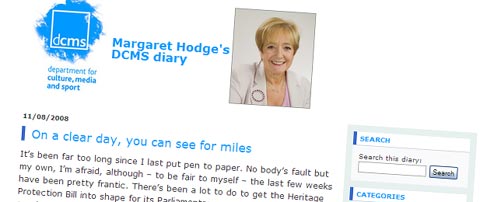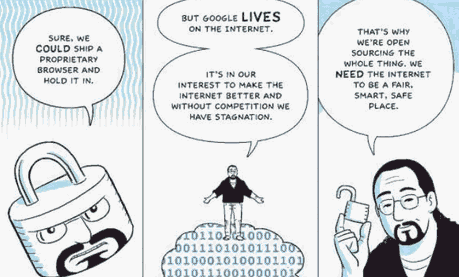Timely, given the release of Google Chrome, and the reopening of the Browser Wars: COI has just issued a consultation document, five months in gestation, on browser standards for public sector websites. Its 15 pages can essentially be boiled down to the following, based on an intriguing 2% rule of thumb:
17. Browsers used by 2% or more of your users must be supported.
18. Operating systems used by 2% or more of your users must be supported (although it rather undermines itself later on, demanding support for Mac and Linux).
19. The two most popular browsers on each supported operating system must be supported.
20. Browsers and operating systems used by less than 2% of your users may be semi-supported. This means that the content and navigation works but the website might not display correctly.
Like it or not then, we’re obliged to ensure the content, functionality and display all work ‘as intended’ on IE6 – although there’s no precise definition of what ‘as intended’ means. One would hope for a pragmatic (ie not ‘pixel perfect’) approach. And it sounds like bad news for Opera, whose user base is highly unlikely to pass the 2% threshold, or hold the no2 ranking on any one OS.
There’s an all too predictable write-up in The Register; Andrew Orlowski opens with the statement that ‘a firestorm is brewing’, and quotes ‘experts’ who say ‘taxpayers will be forced to change their browsing habits and computer setup to accommodate the guidelines.’ I disagree with the first part, and I’m not sure I see the second as a bad thing. It’s entirely appropriate for government to advise people on suitable behaviour where their body’s health is concerned… why not also their PC?
Orlowski quotes Bruce Lawson of the Web Standards Project – and, as Orlowski neglects to point out, a Web Evangelist for Opera – who apparently said something along the lines of ‘designers should conform to commonly agreed basic standards, rather than browser idiosyncrasies.’ (Shame it’s not a direct quote.)
Philosophically, I can’t argue with that point. But pragmatically, it can’t work. The browsers are here, on the ground already; and Utopia it ain’t. You can’t tell people unable to use your site with IE6 that ‘hey, it’s not our fault Microsoft didn’t buy into web standards seven years ago.‘ And whilst the latest browser releases are getting closer to standards compliance, the current IE6 market share of 25% clearly shows (as does the 66% of people hitting COI’s own site) that it’ll take a l-o-n-g time for everyone to upgrade accordingly.
Deep down, I want COI to take a stand on IE6. As I wrote (coincidentally) the other week: development would undoubtedly be quicker, easier and most importantly, cheaper for the taxpayer. A friendly ‘government health warning’ could advise you to upgrade, for this and other good reasons. Others have already set the precedent. But I know such a brave step isn’t likely.
If anyone from COI is reading this, please consider the following to be my contribution to the consultation process:
- There’s an inherent problem with the 2% thing. You don’t have to support a browser unless 2% of your own unique users are using it; but if the site doesn’t support them, they won’t be able to use the site anyway. Catch-2%, you might say. Whilst I see the value in the ‘2% of your specific user base’ rule, it may have to be a global assessment of market share.
- Keep the geeks on board by including an explicit note about web standards, welcoming the progress towards better standards compliance… but acknowledging the reality of current usage levels, particularly as regards IE6.
- Terms like ‘look as intended’ or ‘major/minor maintenance release’ are too vague to be meaningful. Similarly, there are problems with the get-out clause for beta versions (para 27), especially now Google (with its perpetual betas) is in the game.
- There’s no recognition of emerging scenarios like the iPhone or Nintendo Wii (over 1m sold in UK). I accept I may be an ‘edge case’ here, but as video becomes increasingly important to the web experience, I find myself using the Wii – and specifically, the big telly in the living room – to browse the web.
- You simply can’t make an exception for Linux (para 32), or indeed the Mac (para 35). Either the 2% rule stands, or it doesn’t. Grant one exception, and you’ll have countless others making an equally strong case.
- If you’re specifying operating systems, you might as well go the whole way, and specify particular browsers and versions. This isn’t as impossible as it sounds: the BBC does it. There’s a strong case for the simply ‘contracting out’ the testing process to the BBC, and adopting their rules as the gov-wide standard. They are subject to the same accessibility obligations as any government site.
The consultation document is here, in universally browser-unfriendly DOC and PDF formats.


